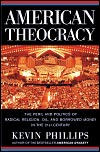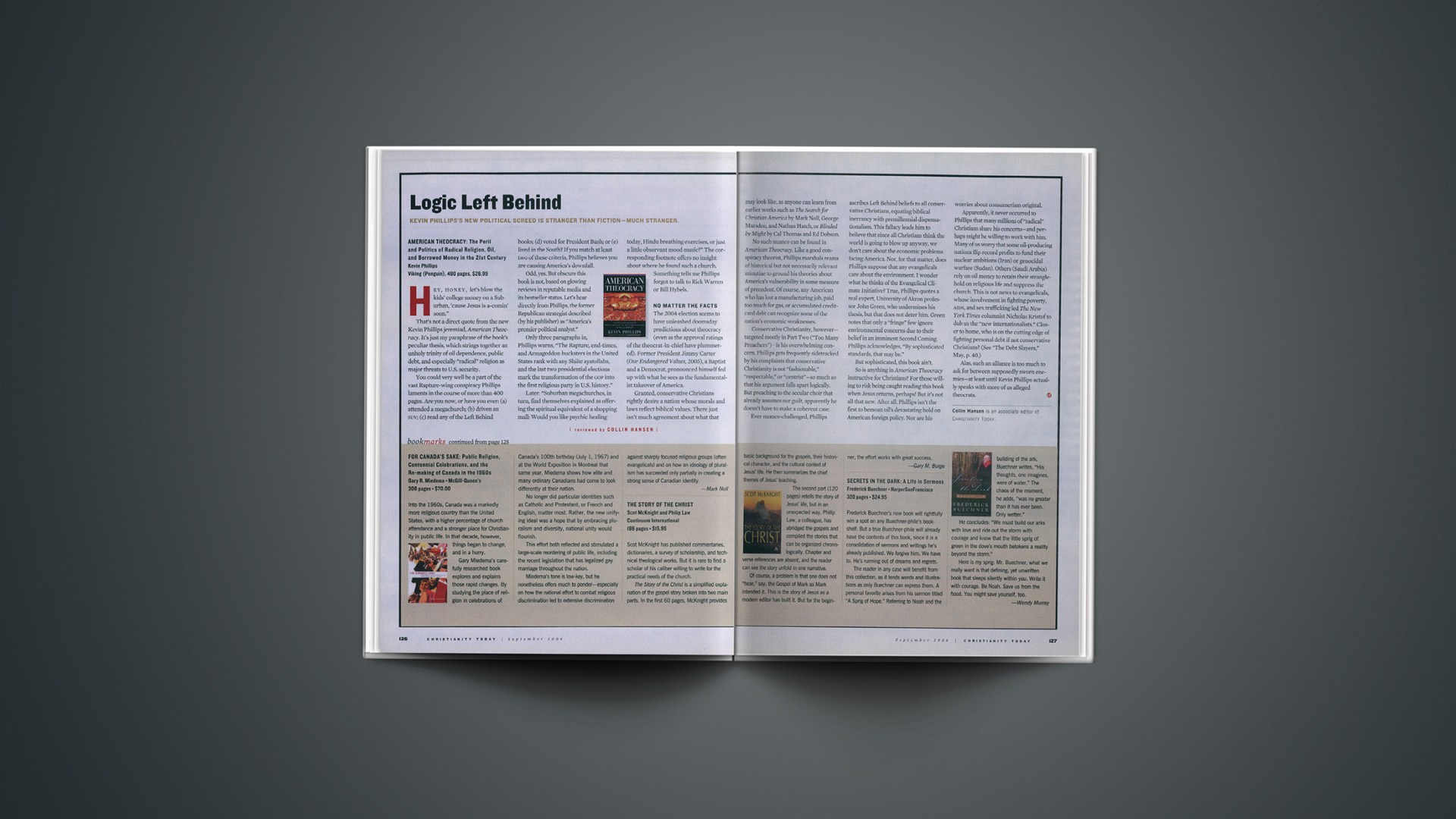Hey, honey, let’s blow the kids’ college money on a Suburban, ’cause Jesus is a-comin’ soon.”
 American Theocracy:The Periand Politics ofRadical Religion,Oil, andBorrowed Moneyin the 21st Centuryby Kevin PhillipsViking (Penguin)480 pp.; $26.95 |
That’s not a direct quote from the new Kevin Phillips jeremiad, American Theocracy. It’s just my paraphrase of the book’s peculiar thesis, which strings together an unholy trinity of oil dependence, public debt, and especially “radical” religion as major threats to U.S. security.
You could very well be a part of the vast Rapture-wing conspiracy Phillips laments in the course of more than 400 pages. Are you now, or have you ever: (a) attended a megachurch; (b) driven an SUV; (c) read any of the Left Behind books; (d) voted for President Bush; or (e) lived in the South? If you match at least two of these criteria, Phillips believes you are causing America’s downfall.
Odd, yes. But obscure this book is not, based on glowing reviews in reputable media and its bestseller status. Let’s hear directly from Phillips, the former Republican strategist described (by his publisher) as “America’s premier political analyst.”
Only three paragraphs in, Phillips warns, “The Rapture, end-times, and Armageddon hucksters in the United States rank with any Shiite ayatollahs, and the last two presidential elections mark the transformation of the gop into the first religious party in U.S. history.”
Later: “Suburban megachurches, in turn, find themselves explained as offering the spiritual equivalent of a shopping mall: Would you like psychic healing today, Hindu breathing exercises, or just a little observant mood music?” The corresponding footnote offers no insight about where he found such a church. Something tells me Phillips forgot to talk to Rick Warren or Bill Hybels.
No Matter the Facts
The 2004 election seems to have unleashed doomsday predictions about theocracy (even as the approval ratings of the theocrat-in-chief have plummeted). Former President Jimmy Carter (Our Endangered Values, 2005), a Baptist and a Democrat, pronounced himself fed up with what he sees as the fundamentalist takeover of America.
Granted, conservative Christians rightly desire a nation whose morals and laws reflect biblical values. There just isn’t much agreement about what that may look like, as anyone can learn from earlier works such as The Search for Christian America by Mark Noll, George Marsden, and Nathan Hatch, or Blinded by Might by Cal Thomas and Ed Dobson.
No such nuance can be found in American Theocracy. Like a good conspiracy theorist, Phillips marshals reams of historical but not necessarily relevant minutiae to ground his theories about America’s vulnerability in some measure of precedent. Of course, any American who has lost a manufacturing job, paid too much for gas, or accumulated credit-card debt can recognize some of the nation’s economic weaknesses.
Conservative Christianity, however—targeted mostly in Part Two (“Too Many Preachers”)—is his overwhelming concern. Phillips gets frequently sidetracked by his complaints that conservative Christianity is not “fashionable,” “respectable,” or “centrist”—so much so that his argument falls apart logically. But preaching to the secular choir that already assumes our guilt, apparently he doesn’t have to make a coherent case.
Ever nuance-challenged, Phillips ascribes Left Behind beliefs to all conservative Christians, equating biblical inerrancy with premillennial dispensationalism. This fallacy leads him to believe that since all Christians think the world is going to blow up anyway, we don’t care about the economic problems facing America. Nor, for that matter, does Phillips suppose that any evangelicals care about the environment. I wonder what he thinks of the Evangelical Climate Initiative? True, Phillips quotes a real expert, University of Akron professor John Green, who undermines his thesis, but that does not deter him. Green notes that only a “fringe” few ignore environmental concerns due to their belief in an imminent Second Coming. Phillips acknowledges, “By sophisticated standards, that may be.”
But sophisticated, this book ain’t.
So is anything in American Theocracy instructive for Christians? For those willing to risk being caught reading this book when Jesus returns, perhaps! But it’s not all that new. After all, Phillips isn’t the first to bemoan oil’s devastating hold on American foreign policy. Nor are his worries about consumerism original.
Apparently, it never occurred to Phillips that many millions of “radical” Christians share his concerns—and perhaps might be willing to work with him. Many of us worry that some oil-producing nations flip record profits to fund their nuclear ambitions (Iran) or genocidal warfare (Sudan). Others (Saudi Arabia) rely on oil money to retain their stranglehold on religious life and suppress the church. This is not news to evangelicals, whose involvement in fighting poverty, AIDS, and sex trafficking led The New York Times columnist Nicholas Kristof to dub us the “new internationalists.” Closer to home, who is on the cutting edge of fighting personal debt if not conservative Christians? (See “The Debt Slayers,” May, p. 40.)
Alas, such an alliance is too much to ask for between supposedly sworn enemies—at least until Kevin Phillips actually speaks with more of us alleged theocrats.
Collin Hansen is an associate editor of Christianity Today.
Copyright © 2006 Christianity Today. Click for reprint information.
Related Elsewhere:
American Theocracy is available from Amazon.com and other book retailers.
In First Things, Ross Douthat recently reviewed a spate of books worried about theocracy.
Books & Culture editor John Wilson discussed a similar book by Randall Balmer.
Philip Yancey worried in his column in CT about the lure of theocracy for evangelicals.









